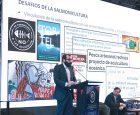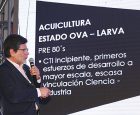
News & Views
Chilean salmon industry tackles sustainability
Cost of the pending regulation for the Chilean salmon industry, as well as a wide variety of technological innovations in the pipeline are intended for the fattening stage. Alternative production models and tighter controls for fish reared in cages at sea seem to be trending topics worldwide as well.
December 11, 2018 By Christian Pérez Mallea
But what about freshwater? That is exactly what we enquire in the latest international conference Aqua Forum (Aqua Sur) held in Puerto Montt in October.
There is an ongoing process of regulation changes in the South American country since the production crisis triggered by the ISA virus a decade ago. Relocation of sea sites and farming densities are currently being discussed and lack of agreement between producing companies and authorities these days are creating some challenges.
Sludge as fertilizer
Eugenio Zamorano, head of the Aquaculture Department at the Chilean Undersecretariat for Fisheries and Aquaculture, recognizes that there are no major changes to the regulation when it comes to freshwater. Maybe the only modification in this area points towards the utilization of the sludge, resulting from farming processes in hatcheries and smolt farms, as fertilizer in agriculture.
“In the year 2010, this regulation was included in the Law, but for different reasons it has not been implemented yet. Basically, it will demand the proper disposal of sludge from freshwater sites with rotating filters, systems to separate liquids from solid materials and a decanter pool that would allow outflow water to return to the stream, at least, in the same original conditions,” he said.
The drafting of this regulation should start by the end of this year and is expected to come into force as of 2019, he added.
For the moment, all these wastes end up in landfills.
Other challenges
In his presentation at Aqua Forum called, “Regulation and institutionality of Chilean aquaculture: A future perspective,” Zamorano emphasized other cross-cutting challenges that the new regulation will address, such as: improve linking between the salmon industry, the local communities and the civil society; promote small-scale aquaculture; reduce the use of antibiotics; promote offshore aquaculture and land-based production systems; and increase the domestic consumption of seafood.
Commenting on the regulation issues, the general manager of Salmones Blumar, Gerardo Balbontín, said “what we are waiting for and seeing, is that finally the current regulatory framework – which is in the process of adjustment – manages to consolidate and satisfy the majority of the industry, because we really need to have an industry that can have sustainable growth, which is the most important thing, we all want to grow, but it must be a sustainable growth.”
Innovations in freshwater
In his presentation titled, “The challenges of innovation in Chilean aquaculture: gaps and advancements,” Adolfo Alvial, director of AQUA Media and ORBE XXI, commented that one of the greatest innovations in this field is finding ways to keep fish in freshwater for longer periods of time and transferring them at a bigger size, strength and robustness to sea water.
“This means not only prolonging the permanence of fish in freshwater, but also taking advantage of strengthening them in a period that is critical for the subsequent development of fish,” he said.
He also cited sustainability, competitiveness, research and development, and a closer relation with the neighboring communities as among the other gaps in the industry that need to be addressed. The Chilean salmon industry faced large criticisms following three incidents in recent years that put the producers in a bad light: the disposal of 4,600 tonnes of salmon mortalities in the open sea in 2016, the sinking of wellboat ‘Seinkongen’ with 200 tonnes of salmon in Chiloé in 2017, and the escape of almost 700,000 fish from a site belonging to Marine Harvest Chile in 2018.
Print this page
Advertisement
- Canadian government makes move to improve aquaculture industry
- Pincoy Project rewarded for combatting antibiotics in aquaculture







